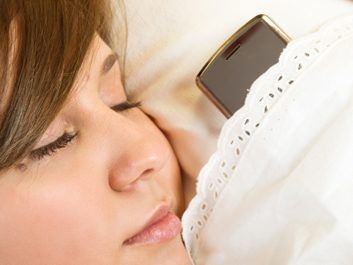Can a smart phone app help you sleep?
There are hundreds of sleep apps on the market, all claiming to help you get the rest you need to be healthy. But do they work?

Source: Web exclusive, March 2011
Not getting enough sleep can negatively affect your health in several ways’weight gain and increased risk for type 2 diabetes, to name a few. However, getting adequate rest is a big challenge for the 25 percent of Canadians who suffer from major sleep issues.
“Sleep is something that concerns all of us,” says Dr. Maureen Ceresney, a psychiatrist at University of British Columbia’s Sleep Disorders Clinic. So it’s not surprising that there’s an app for that. Hundreds, actually’all promising to help you get some shuteye. But do they really work? We rounded up some of the most popular types of sleep apps and asked experts to weigh in the pros and cons of each.
White noise and sound apps
If falling asleep is your problem, a white noise or sound app may help you drift off. Katy Somers, director of the Better Sleep program at the University of Guelph, Ont., says these apps may help some users by distracting busy brains from stressful thoughts. The steady, calming noise will also mask outdoor sounds and the little creaks and bumps in the night that prevent some people from falling asleep. However, she cautions that listening to the same soundtrack all night may backfire on you. "Our brains will tend to follow those kinds of sounds and try to predict the next part of the music."
If you are using a white noise app, it is recommended that you program the timer to turn the sound off once you fall asleep.
Some sound apps to try:
Relax Melodies (iPhone, free)
Relax Melodies is the most popular free sleep app available for the iPhone. It allows you to mix 70 different sounds to create a personalized lullaby to help you fall asleep.
White Noise (iPhone, Android, Blackberry, $2)
This app offers an ambient sound for everything from crickets to dripping water.
Sleep cycle monitoring alarms
No one likes being woken up abruptly from a deep sleep by a blaring alarm. To remedy this, there are several apps on the market that claim to monitor your sleep cycle and wake you up during your lightest phase of sleep when you feel rested and relaxed. But how can an app tell what stage of sleep you’re in?
Ceresney says that if a phone is able to accurately measure movement, it may be able to distinguish between REM (deep sleep) and non-REM (lighter) sleep. However, she adds that monitoring movement isn’t a fail-safe way to determine sleep stages ‘There are people who may actually still have movement in REM sleep because of a particular type of sleep disorder, or the affects of certain medication.’ She says that the most accurate way to determine sleep cycle is by measuring brain activity, as experts do in a sleep lab.
Some sleep cycle monitoring apps to try:
Sleep Cycle (iPhone, $1)
The Sleep Cycle alarm clock is the top paid app in many countries. Using the iPhone’s accelerometer to measure movement, this app claims that it will wake you up during your lightest sleep phase.
Sleep As An Droid (Android, free)
This is also an alarm clock which measures sleep cycle using the phone’s accelerometer. Sleep As An Droid also has added features such as music playback to help you fall asleep, sleep noise recording and the ability to rate sleep and make additional comments.
Journaling apps
There are many variables that can affect our ability to have a good night’s rest, so it can be tough to put your finger on what’s keeping you up. A sleep journaling app can help users identify patterns and assess how these habits influence their sleep experience. Keeping your sleep journal on your phone means you’ll have it handy when you need it, as it is important to record diet, exercise and overall energy level during the day as well as habits that affect you at night, says Dr. Rachel Morehouse, medical director of the Atlantic Health Sciences Sleep Centre.
While sleep journaling can help you pinpoint what’s keeping you up, Morehouse warns against developing a sleep-journaling habit. ‘It’s possible to get kind of neurotic about your sleep and when that happens, it actually makes sleep worse [because] you kind of get a performance anxiety about sleep,’ she says.
Some journaling apps to try:
Sleep Bot Tracker Log (Android, free)
Sleep Bot Tracker Log tracks the number of hours you sleep with a simple punch-in and punch-out system. This app also provides space for journaling and an integrated questionnaire that calculates sleep debt.
Sleep Tracker (iPhone, free)
This simple app allows you to record your hours of sleep and mood. There’s also space to add additional notes for journaling purposes. Sleep Tracker charts your entries, making it easier to see how your sleep habits are affecting your mood over time.
Give sleep a chance
If you do decide to try a sleep app (or any other sleep remedy) give it about three or four weeks to work. "Sleep is behaviour and it does take a while to change behaviour," says Somers.
Also, keep in mind that these apps are general self-help programs not personalized medical solutions. ‘It’s important to remember that people can be very different, what might work well for me might not work for you,” says Ceresney. If you are having problems with sleep for extended periods of time, consult a medical professional.
Don’t miss out! Sign up for our free weekly newsletters and get nutritious recipes, healthy weight-loss tips, easy ways to stay in shape and all the health news you need, delivered straight to your inbox.




